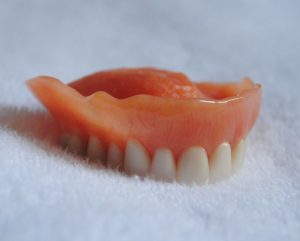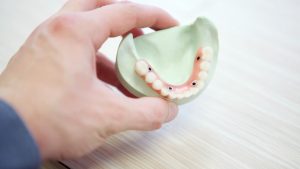Imagine if you could get back to savouring your favourite foods. Think about how it would feel to love your smile again and enjoy the feeling of healthy, attractive, non-removable teeth. All of this is a possibility with full mouth implants, offered at Rockcliffe Dental & Denture Centre. Read on to learn everything you need to know about full plate or full mouth dental implants in Ottawa.
 What are Full Mouth Dental Implants?
What are Full Mouth Dental Implants?
The term “full mouth dental implants” or “full plate dental implants” describes any implant procedure aimed to replace all of your missing teeth in either your upper or lower arch. This can be done with four to six implants working together as a team to support a full bridge or denture. “All-on-4”, “All-on-5”, and “All-on-6” are all different types of a full-mouth restoration.
While the general population may refer to this dental procedure as “full mouth dental implants”, within the dental community, this solution is known as “two arches of implant-supported, non-removable, prosthetic teeth.”
How Do Full Mouth Dental Implants Work?
Full mouth dental implants present 4-6 implants placed within the upper or lower arch of your mouth. They work together to support a dental prosthesis that replaces all of the missing teeth in one arch.
With this permanent teeth replacement solution, patients won’t experience discomfort and anxiety associated with wearing traditional dentures. Just imagine, no more sliding from side to side, no more denture cleaning or sore spots in your mouth. You won’t have to worry about your denture slipping out while you speak or sneeze and will be able to enjoy your social life to the fullest.
How Much Do Full Mouth Dental Implants Cost in Canada?
In Canada, full mouth dental implants will cost you between $7,000 and $28,000 per arch. The exact price range of dental implant restorations depends on the types of implants used and whether additional procedures, such as bone graft, are required.
Book a consultation with one of our implant dentists at Rockcliffe Dental & Denture Centre to receive a detailed treatment plan and implant cost estimate.
Benefits of Complete Teeth Replacement with Full Mouth Implants
There are a few ways in which patients can benefit from full mouth dental implants in Ottawa:
1. Preservation of Adjacent Teeth
When natural teeth do double the work in supporting the bite pressure of a removable denture or bridge, it leads to the weakening and wear of natural teeth.
On the other hand, full mouth implants protect the remaining natural teeth by preventing them from shifting and misalignment problems. In addition, dental implants serve as a root to attach the dental prosthetic. As such, they don’t require filing down of healthy teeth as with dental bridges.
2. Preservation of Adequate Bone Structure
While gum tissues support natural teeth, the gums themselves receive support from the jawbone. As soon as you lose a natural tooth, bone loss occurs, and the jawbone shrinks. This can cause changes to facial structure and make the cheeks and corners of the mouth appear saggy and sunken.
Implant screws the same purpose as natural teeth roots, stimulating the jawbone and providing stability to the crown.
3. Higher Success Rate
In a nutshell, a dental implant is a titanium post that a dentist screws into a jawbone. Its amazing strength arises from the bone and gum that grow around the post. Unlike bridges or dentures, implants don’t require periodic replacement and, with proper oral hygiene, a full dental implant can last you a lifetime.
4. Cost-Efficient
A full mouth dental implant procedure is more cost-efficient than a single implant restoration: with complete tooth implants, all of the artificial replacement teeth are supported with only four to six metal posts.
And, while the cost of dental implants may bring hesitation at first, remember that a one-time charge results in decades of use and comfort.
Full Mouth Dental Implants Process
A full mouth dental implant treatment and surgical procedure are performed by a dental surgeon and involve several stages with a few months of healing time in between:
 Implant placement. An oral surgeon places several implants, which look like metal screws, into the jaw. These will serve as anchors for your artificial teeth in the future. The implants then heal and bond with the bone for the next 2 to 6 months, – during this period, you may be wearing a temporary teeth replacement option.
Implant placement. An oral surgeon places several implants, which look like metal screws, into the jaw. These will serve as anchors for your artificial teeth in the future. The implants then heal and bond with the bone for the next 2 to 6 months, – during this period, you may be wearing a temporary teeth replacement option.- Extension attachment. Some implant treatment systems include an implant that comes with the healing abutment attached right away. These temporary healing caps with connecting devices serve to allow your gums to take the correct shape while healing. In other cases, a dentist will expose implants and attach extensions in a separate step. Then, your gums will need to heal for another couple of weeks after the procedure.
- Placement of prosthetic teeth. Finally, a full denture or full arch bridge will be custom made and attached to the connecting devices called abutments. Soon, you will experience a restored ability to chew and speak.
Taking Care of a Full Mouth of Dental Implants
You can take care of full mouth dental implants the same way you would take care of your natural teeth. Proper brushing and flossing, using a mouth rinse, and visiting your dentist regularly for check-ups will help to prevent periodontal disease and ensure that your full arch implants serve you for many years to come.
Here are a few additional tips to keep in mind when taking care of a full-mouth restoration:
- Brush your implants. Brush your implants twice a day the same way you would brush natural teeth. Aim to spend at least two minutes brushing your teeth each time.
- Keep flossing. Use dental floss daily to properly clean around the implants. There is a special technique for full mouth implants, – make sure to ask your dentist to go over it with you.
- Use low-abrasive toothpaste. Make sure to use low-abrasive toothpaste to avoid damaging your dental restorations.
- Use a water flosser. A water flosser is an excellent addition to your oral hygiene routine, as it allows you to completely clean in between your prosthetic teeth and reduces the overall bacterial population in your mouth.
- Use a mouth rinse. Use an antimicrobial mouth rinse twice a day to ensure that you completely remove all the food particles and bacteria in order to prevent severe gum disease.
- Consider disclosing tablets. Disclosing tablets will stain the areas on your teeth where plaque has accumulated, therefore making it easier to see where you need to clean your teeth more thoroughly.
Get a Full Set of New Teeth with Rockcliffe Dental & Denture Centre
Do you think that you may be a good candidate for full-mouth dental implants in Ottawa? Scheduling an initial consultation at Rockcliffe Dental & Denture Centre to learn about our dental services is a great place to begin. Our implant dentists will thoroughly examine your oral health and suggest a treatment plan to restore your smile and confidence.
Contact our dental office today and book an implant consultation to start your journey to a new, beautiful full set of teeth.
Full Mouth Dental Implants FAQ
The exact number of dental implants required for a full arch of new teeth can vary between 4 and 6 implants per arch, depending on whether it is an upper or lower arch and the number of replacement teeth that require support. The size of your jaw and the quality of bone will also affect the type of procedure and the optimal number of implants per arch for a complete tooth replacement.
Most of the time, a dentist will perform one of the following procedures:
- All-on-4 dental implants
- All-on-5 dental implants
- All-on-6 dental implants
Generally, the entire full mouth dental implant process takes between 5 and 8 months. However, it could take longer if additional gum or bone grafting procedures are needed.
The surgery to place implant posts themselves takes approximately 2.5 to 3.5 hours per arch.
With proper dental hygiene, the implant screws themselves can last up to 25 years and more. It isn’t uncommon to have dental implants serve you a lifetime without ever requiring replacement.
However, the prosthetic teeth supported by implants, such as implant dentures, overdentures, or implant-supported bridges, will eventually require replacement due to regular wear and tear.
With the “Teeth-in-One-Day” dental implant treatment, a dentist places a full arch of temporary, functional teeth on the same day of your implant surgery.
However, your jawbone and gums still need some time to heal and recover in between placing the implants and attaching the permanent prosthesis. As such, the entire process of getting full mouth implants can take 5-8 months or longer if the dentist recommends additional bone graft.
Read More: